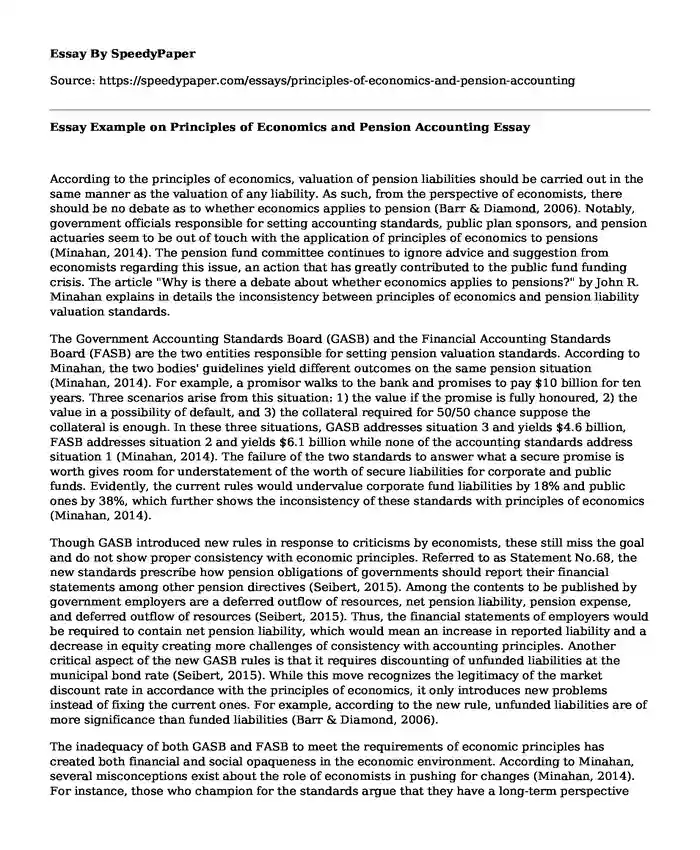
| Type of paper: | Essay |
| Categories: | Economics Accounting |
| Pages: | 3 |
| Wordcount: | 658 words |
According to the principles of economics, valuation of pension liabilities should be carried out in the same manner as the valuation of any liability. As such, from the perspective of economists, there should be no debate as to whether economics applies to pension (Barr & Diamond, 2006). Notably, government officials responsible for setting accounting standards, public plan sponsors, and pension actuaries seem to be out of touch with the application of principles of economics to pensions (Minahan, 2014). The pension fund committee continues to ignore advice and suggestion from economists regarding this issue, an action that has greatly contributed to the public fund funding crisis. The article "Why is there a debate about whether economics applies to pensions?" by John R. Minahan explains in details the inconsistency between principles of economics and pension liability valuation standards.
The Government Accounting Standards Board (GASB) and the Financial Accounting Standards Board (FASB) are the two entities responsible for setting pension valuation standards. According to Minahan, the two bodies' guidelines yield different outcomes on the same pension situation (Minahan, 2014). For example, a promisor walks to the bank and promises to pay $10 billion for ten years. Three scenarios arise from this situation: 1) the value if the promise is fully honoured, 2) the value in a possibility of default, and 3) the collateral required for 50/50 chance suppose the collateral is enough. In these three situations, GASB addresses situation 3 and yields $4.6 billion, FASB addresses situation 2 and yields $6.1 billion while none of the accounting standards address situation 1 (Minahan, 2014). The failure of the two standards to answer what a secure promise is worth gives room for understatement of the worth of secure liabilities for corporate and public funds. Evidently, the current rules would undervalue corporate fund liabilities by 18% and public ones by 38%, which further shows the inconsistency of these standards with principles of economics (Minahan, 2014).
Though GASB introduced new rules in response to criticisms by economists, these still miss the goal and do not show proper consistency with economic principles. Referred to as Statement No.68, the new standards prescribe how pension obligations of governments should report their financial statements among other pension directives (Seibert, 2015). Among the contents to be published by government employers are a deferred outflow of resources, net pension liability, pension expense, and deferred outflow of resources (Seibert, 2015). Thus, the financial statements of employers would be required to contain net pension liability, which would mean an increase in reported liability and a decrease in equity creating more challenges of consistency with accounting principles. Another critical aspect of the new GASB rules is that it requires discounting of unfunded liabilities at the municipal bond rate (Seibert, 2015). While this move recognizes the legitimacy of the market discount rate in accordance with the principles of economics, it only introduces new problems instead of fixing the current ones. For example, according to the new rule, unfunded liabilities are of more significance than funded liabilities (Barr & Diamond, 2006).
The inadequacy of both GASB and FASB to meet the requirements of economic principles has created both financial and social opaqueness in the economic environment. According to Minahan, several misconceptions exist about the role of economists in pushing for changes (Minahan, 2014). For instance, those who champion for the standards argue that they have a long-term perspective rendering the discussion a simple misunderstanding. Additionally, others posit that economists only focus on termination liabilities and finally, that it is impossible to lower the discount rate (Minahan, 2014). The solution to all these challenges lies with GASB, which needs to incorporate transparency in the liability valuation guidelines. Transparency will not only eliminate the misconceptions but also, ensure the rules do not obscure the value of pension guarantees made by public plan sponsors.
References
Barr, N., & Diamond, P. (2006). The economics of pensions. Oxford Review of Economic Policy, 15-39.
Minahan, J. R. (2014). Why is there debate whether economics applies to pension. Journal of Investing , 7-14.
Seibert, J. E. (2015). Pensions: Government obligation to appear in financial statements. Pennsylvania CPA Journal, 24-27.
Cite this page
Essay Example on Principles of Economics and Pension Accounting. (2022, Aug 19). Retrieved from https://speedypaper.net/essays/principles-of-economics-and-pension-accounting
Request Removal
If you are the original author of this essay and no longer wish to have it published on the SpeedyPaper website, please click below to request its removal:
- Essay Example on Mall Ethnography
- Free Essay: Fathers' and Siblings' Responses to Disabled Family Members
- Free Essay: The Bankrupt Bank of Justice
- Supporting Significant Life Event in Health and Social Care
- Free Essay. Doughnut Economics: 7 Ways to Think Like a 21st Century Economist
- Why I Disagree With Robert Kaplan - Essay Sample
- Enhancing Employee Well-being: A Strategic Approach to Health Benefits Implementation in the Workplace
Popular categories




